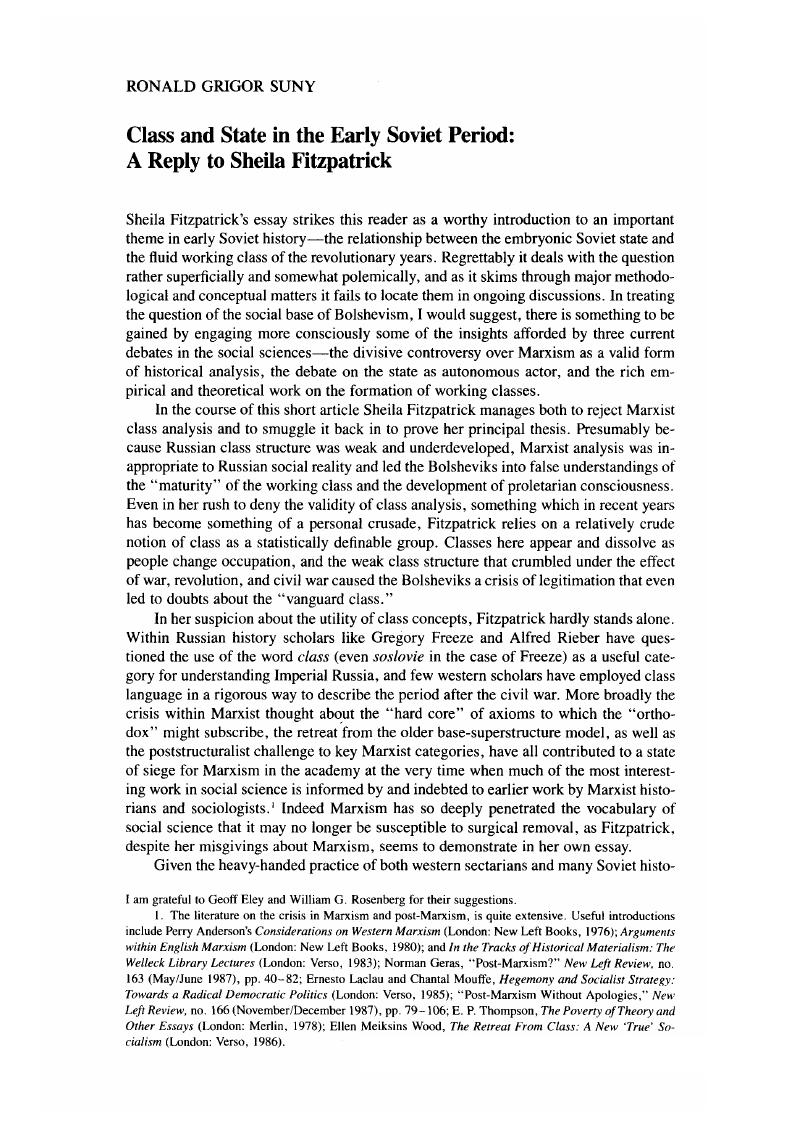No CrossRef data available.
Article contents
Class and State in the Early Soviet Period: A Reply to Sheila Fitzpatrick
Published online by Cambridge University Press: 27 January 2017
Abstract

- Type
- Discussion
- Information
- Copyright
- Copyright © Association for Slavic, East European, and Eurasian Studies. 1988
References
I am grateful to Geoff Eley and William G. Rosenberg for their suggestions.
1. The literature on the crisis in Marxism and post-Marxism, is quite extensive. Useful introductionsinclude Anderson's, Perry Considerations on Western Marxism (London: New Left Books, 1976 Google Scholar; Argumentswithin English Marxism (London: New Left Books, 1980); and In the Tracks of Historical Materialism: The Welleck Library Lectures (London: Verso, 1983); Geras, Norman, “Post-Marxism?” New Left Review, no.163 (May/June 1987), pp. 40–82Google Scholar; Ernesto, Laclau and Chantal, Mouffe, Hegemony and Socialist Strategy: Towards a Radical Democratic Politics (London: Verso, 1985 Google Scholar; “Post-Marxism Without Apologies,” NewLeft Review, no. 166 (November/December 1987), pp. 79–106; Thompson, E. P., The Poverty of Theory andOther Essays (London: Merlin, 1978 Google Scholar; Wood, Ellen Meiksins, The Retreat From Class: A New ‘True’ Socialism (London: Verso, 1986 Google Scholar.
2. For a discussion of this problem, see my review article “Marx, Russia, and Soviet History” in International Labor and Working-Class History, no. 33 (Spring 1988), pp. 68–79.
3. Lewin, Moshe, The Making of the Soviet System: Essays in the Social History of Interwar Russia (New York: Pantheon, 1985, pp. 193–194 Google Scholar.
4. Fitzpatrick, Sheila, The Russian Revolution 1917–1932 (Oxford: Oxford University Press, 1984, p. 8 Google Scholar.
5. Here a most useful introductory text is Carnoy, Martin, The State and Political Theory (Princeton, N.J.: Princeton University Press, 1984)CrossRefGoogle Scholar. See also, Block, Fred, “The Ruling Class Does Not Rule,” SocialistRevolution 7, no. 3 (1977) pp. 6–28 Google Scholar; Gold, David A., Lo, Clarence Y. H., and Wright, Erik Olin, “Recent Developments in Marxist Theories of the Capitalist State,” Monthly Review 27 (October 1975), pp. 29–43, and (November 1975), pp. 36–51CrossRefGoogle Scholar; Evans, Peter B., Rueschemeyer, Dietrich, and Skocpol, Theda (eds.), Bringing the State Back In (New York: Cambridge University Press, 1985 CrossRefGoogle Scholar; Jessop, Bob, Theories of the State (New York: New York University Press, 1983)Google Scholar; and Therborn, Goran, What Does the Ruling Class Do Whenit Rules? State Apparatuses and State Power under Feudalism, Capitalism and Socialism (London: New Left Books, 1978 Google Scholar.
6. The literature on working-class formation is extensive, but useful introductions are afforded by Katznelson, Ira and Zolberg, Aristide R. (eds.), Working-Class Formation: Nineteenth-Century Patterns in Western Europe and the United States (Princeton, N.J.: Princeton University Press, 1986)Google Scholar, particularly the introductory essay by Katznelson, Ira; Stedman-Jones, Gareth, Languages of Class: Studies in English WorkingClass History, 1832–1982 (New York: Cambridge University Press, 1983 Google Scholar; Sewell, William H., Jr., Workand Revolution in France: The Language of Labor from the Old Regime to 1848 (New York: Cambridge University Press, 1980 CrossRefGoogle Scholar; and his essay, “How Classes are Made: Critical Reflections on E. P. Thompson's Theory of Working-Class Formation” in Kaye, Harvey J. and McClelland, Keith, eds., E. P. Thompson: Critical Debates (Oxford: Basil Blackwell, forthcoming)Google Scholar.
7. H. Haimson, Leopold, “The Problem of Social Identities in Early Twentieth Century Russia, “Slavic Review 47 (Spring 1988): 5.Google Scholar




